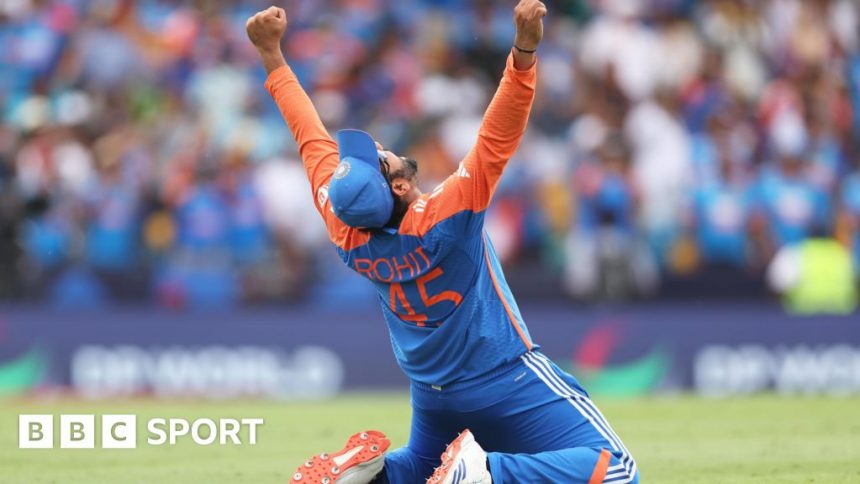‘India triumph as World Cup gets its Hollywood finale’
Highlights: South Africa v India
-
Published
Cricket’s attempt to crack the United States got its Hollywood ending.
South Africa looked to have the T20 World Cup won before India surged back to take the title in one final twist.
Throughout the finale the plots of tournaments gone by flashed before our eyes.
For India it was the pain of defeat in the 50-over World Cup final eight months ago. That day a crowd of 90,000 arrived in Ahmedabad but Australia had read the wrong script.
Before that there had been the thrashing by England in Adelaide in 2022, defeat by New Zealand in the Manchester rain in 2019 and the loss to West Indies in 2016, again in front of an expectant home crowd, since their last World Cup win.
India had at least won one before. For South Africa the past was nothing but pain.
The rain in Sydney, Allan Donald’s run-out in 1999, getting the maths wrong in 2003 and Grant Elliott at Eden Park in 2015. It all resurfaced as part of the narrative.
Watch the best shots of Kohli’s “excellent” 76 in the T20 World Cup final
Either way this was going to be an emotional finale, with inner demons to overcome.
As it was Virat Kohli charged in to embrace Hardik Pandya, while Rohit Sharma dropped to the floor in celebration.
This was Rohit’s redemption, captain of India here as he was during the disappointment last year.
Having had a leading role in The Agony of Ahmedabad, he has completed the sequel – The Kensington Coronation.
Kohli won the 50-over World Cup in 2011 as part the supporting cast. The then 22-year-old lifted the great Sachin Tendulkar onto his shoulders in the victory lap.
This time he was the leading man.
He struggled throughout this tournament, floundering as India progressed unbeaten through both group stages and the semi-finals, but was always lurking – like the baddie that has never been killed off.
Kohli hit three fours in his first four balls. After that he stood casually leaning against his bat, one arm on his hip. He was back.
His nonchalant flick onto the roof of the Sir Garfield Sobers pavilion will be a moment played over and over – as will the Suryakumar Yadav catch at the death and Jasprit Bumrah’s ferocious dismissal of Reeza Hendricks that was enough to send batters around the world hiding behind the sofa.
In the celebrations, Rohit and Kohli stood arm in arm, before announcing they will depart this stage, with this their last T20 international.
Bumrah bowls Hendricks for four
South Africa’s players, in contrast, became the characters your heart breaks for.
As the trophy presentation began, David Miller dropped to his haunches and stared at the ground, while tears flowed from the eyes of Heinrich Klaasen.
This was so nearly a story about Klaasen, who took the Proteas to the brink with 52 from 27 balls. Afterwards he was consoled on the outfield by his wife and young daughter.
Some will say the South Africa of previous years returned. Others can rightly argue India were just too good.
In Bumrah they have the world’s best bowler – a man who conceded only 18 runs from his 24 balls and will go down as one of the greats.
Kuldeep Yadav had a rare off day in the final, but the last two weeks have shown he is the game’s premier spinner, while Rohit’s 92 against Australia was one of the best knocks of the past four weeks.
When it came to the crunch, Rohit turned to his all-rounder Hardik, who delivered, while his Proteas opposite number Marco Jansen faltered.
The win was celebrated wildly in the stands by India fans who had flown into Barbados over the previous days.
India lift T20 World Cup trophy
Elsewhere others will roll their eyes.
The Rocky theme played at the Kensington Oval when England met USA last week but this was not an underdog story.
India, already the dominant force in the world game, progressed having been the only team to know in advance where their semi-final would be played.
It mattered not, England would have been resoundingly beaten at Lord’s as well as Guyana, but preventing such a scenario again is one of the minor tweaks that could improve the T20 World Cup.
Fixing the draws so India meet Pakistan and England face Australia may boost the coffers but it cheapens the product.
A week could have been taken off this tournament had it progressed straight from the first stage to quarter-finals when also moving solely to the Caribbean. Two group stages are never necessary.
The International Cricket Council should also thank Josh Hazlewood, because had Australia not been spooked by the reaction to his ill-judged words about manipulating their result against Scotland, a farcical situation may have occurred on the field.
But overall this has been the best of the three men’s World Cups, two T20 and one 50-over, that have been squeezed into the past 21 months.
Its biggest success was that it was the first to go truly global – upped to 20 teams.
There may have been one-sided fixtures in the group stage but the presence of Uganda, Papua New Guinea, the USA, Nepal and other smaller nations brought freshness and excitement.
Uganda’s 39 all out or Oman being beaten inside 17 overs by England were negatives but those were resoundingly outweighed by USA’s iconic victory over Pakistan, Papua New Guinea coming close to beating hosts West Indies and Brandon McMullen’s superb performances for Scotland.
It is for those moments as much as the finale that this tournament will be remembered.
In the end, though, it is India’s name that goes up in lights.
Related Topics
-
-
Published14 May
-






